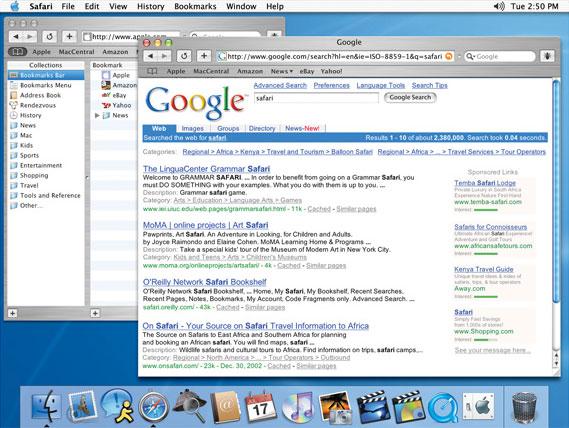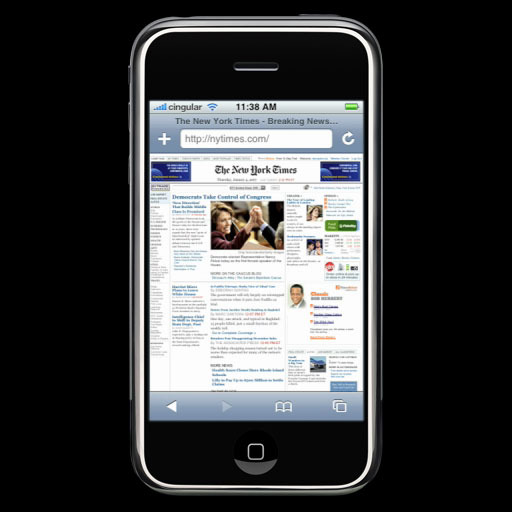Steve Jobs unveiled the "Fastest Web Browser Ever Created for the Mac" this day back in 2003, introducing the Safari web browser that four years later would power a new kind of mobile browsing experience on iPhone.
Safari 1
The appearance of Safari may have seemed to be too late to matter in the history of HTML development; Microsoft and Netscape/Mozilla had already battled over web browsers, resulting in an established pair of browser engines that appeared to limit the emergence of any new challengers.
"We are bringing innovation back into this category with the first all new browser created in many years," Jobs stated.
A return to open web standards
Launching its own web browser enabled Apple to not only retain its customers as the importance of the web increased and as Netscape and Microsoft wavered in their interest in supporting the Mac platform, but also gave Apple greater control over the direction of web standards.
Apple not only launched its own browser app but also developed a unique WebCore browser engine (based on a fork of KHTML, an existing open source project) in competition with Microsoft's Trident and Mozilla's Gecko.
Apple's parallel push for open, complete web standards, rather than the proprietary web extensions favored by Microsoft, created a more consistent platform for web developers and a more level playing ground for all browser developers. In 2008, WebKit became first browser engine to fully pass Acid3 rendering test.
Owning the critical technology also allowed Apple to advance adoption of HTML5 as an open alternative to web apps and video necessitating a proprietary middleware plugin such as Adobe Flash or Microsoft Silverlight. A core feature of HTML5 is Canvas, Apple's patented technology that it contributed royalty-free to accelerate the development of the open web. This came largely at the expense of Microsoft and Adobe.
A massive open source project
While Safari's WebCore and JavaScript Core libraries (both sourced from KHTML) were always open source, Apple announced in 2005 that it would be making its entire browser implementation available to the community, resulting in WebKit, a complete package other vendors could use to quickly launch their own browsers.
Nokia contributed efforts to bring WebKit to its mobile phones and Google launched Chrome as an WebKit browser for Windows in preference to perpetually funding Mozilla's development of an Internet Explorer alternative. Apple initially maintained a port of Safari for Windows PCs, but eventually stopped the project as Google and other developers took over the work of maintaining WebKit on Windows.
In 2007, Apple launched Safari on the original iPhone using the same WebKit engine and a new multitouch interface. "We wanted the best web browser on a phone," Jobs said, "so we picked the best one in the world, Safari. We have Safari running on iPhone — it's the first fully-usable browser on a cellphone."
Because Google subsequently also used WebKit in Android, the fledgeling browser engine Apple had introduced in the face of overwhelming competition on the PC desktop quickly became the dominant mobile browser. Today, it's virtually the only browser in use on mobile devices.
 Daniel Eran Dilger
Daniel Eran Dilger








-m.jpg)






 Marko Zivkovic
Marko Zivkovic
 Mike Wuerthele
Mike Wuerthele
 Christine McKee
Christine McKee
 Amber Neely
Amber Neely
 Sponsored Content
Sponsored Content
 Wesley Hilliard
Wesley Hilliard

 William Gallagher
William Gallagher









19 Comments
Safari on mobile is pretty legendary. It's always been a cut above the rest.
I still have nightmares about what browsers were like on the Mac before Safari. For years Microsoft’s IE browser was the default on the Mac (as a result of the deal between Jobs and Gates). But IE for the Mac was a crippled joke and many websites wouldn’t work properly even though they advertised being IE compatible. IE for Windows maybe but not IE for Mac. Netscape was long gone, “embraced and extended” to death by Microsoft. Alternatives were all but non-existent. There were more than a few websites that quite literally told Mac users to go away and not come back. When Safari debuted I immediately made it my browser of choice and so it remains to this day for me. I couldn’t care less about Firefox, Chrome, Opera or any other third party browser that claims to be God’s gift to the Internet.
Yep, cheers to Safari! Oh, and and rot in hell IE!
Microsoft tried pretty hard to make a rough road for other browsers. It was IE 6 that was the worst bastard browser. MS made it to run smoothest in their own OS. They MS produced a website development program that would basically make the newly made site a Windows-only site for visitors. What a bunch of communists!
For what it's worth, a few days ago MS threw in the towel on supporting all their old browsers, up to and including IE 10. Can you believe it!?